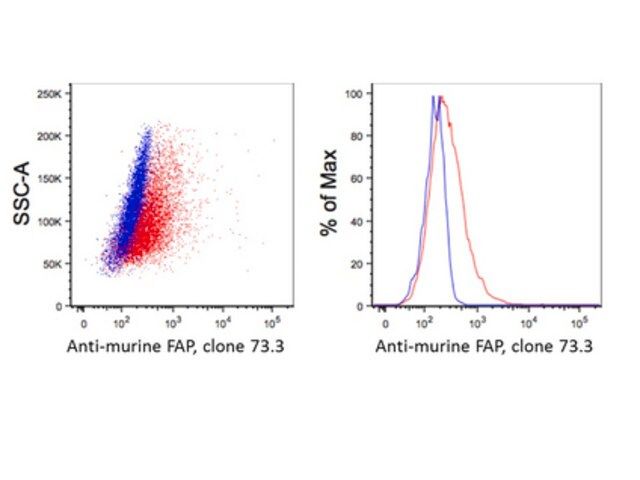您的位置:首页 > 产品中心 > Anti-FAP Antibody, clone 73.3
Anti-FAP Antibody, clone 73.3

产品别名
Anti-FAP Antibody, clone 73.3
Fibroblast activation protein, Propyl endopeptidase FAP, Dipeptidyl peptidase FAP, Serine integral membrane protease, SIMP
基本信息
| eCl@ss | 32160702 |
| General description【一般描述】 | Fibroblast activation protein (UniProt: ; also known as Propyl endopeptidase FAP, Dipeptidyl peptidase FAP, Serine integral membrane protease, SIMP) is encoded by the Fap gene (Gene ID: 14089) in murine species. FAP is a homodimeric type II transmembrane protein that physically attaches to cells and bulk of the protein is exposed to extracellular space. It is a gelatinase of the serine protease family that is selectively expressed by tumor associated fibroblasts and pericytes in a majority of human epithelial cancers, granulation tissue of healing wounds, and malignant cells of bone and soft tissue sarcomas. It is not expressed in most normal tissues, but is expressed during embryonic development. It is present as a homodimer and homodimerization is required for activity of both plasma membrane and soluble forms. It can also form heterodimer with DPP4. Both plasma membrane and soluble forms exhibit post-proline cleaving endopeptidase activity, with a marked preference for Ala/Ser-Gly-Pro-Ser/Asn/Ala consensus sequences. Its gelatinase activity is inhibited by several serine-protease inhibitors, such as PMSF, AEBSF, and diisopropyl fluorophosphate (DFP). FAP is involved in the control of fibroblast growth or epithelial-mesenchymal interactions during development, tissue repair, and epithelial carcinogenesis. It is also involved in the cell invasiveness towards the ECM in malignant melanoma cancers. (Ref.: Kelly, T et al. (2012). Int. Rev. Cell Mol. Biol. 297:83-116; Santos, AM et al. (2009). J. Clin. Invest. 119(12):3613-3625). |
| Specificity【特异性】 | Clone 73.3 specifically detects fibroblast activation protein (FAP) in 3T3 cells overexpressing FAP. |
| Immunogen【免疫原】 | FAP-expressing 3T3 cells. |
| Application【应用】 | Detect fibroblast activation protein using this mouse monoclonal Anti-FAP Antibody, clone 73.3, Cat. No. MABC1145. It has been tested in Flow Cytometry. Research Category Apoptosis & Cancer Flow Cytometry Analysis: A representative lot detected FAP in Flow Cytometry applications (Wang, L.C., et. al. (2014). Cancer Immunol Res. 2(2):154-66). Flow Cytometry Analysis: 1 µg/mL from a representative lot detected FAP in 3T3/FAP overexpressed cells, but not in 3T3 WT cells. (Courtesy of Leslie Hopper, University of Pennsylvania, USA). |
| Quality【质量】 | Isotype testing: Identity Confirmation by Isotyping Test. Isotyping Analysis: The identity of this monoclonal antibody is confirmed by isotyping test to be mouse IgG1 . |
| Physical form【外形】 | Protein G purified Format: Purified Purified mouse monoclonal antibody IgG1 in buffer containing 0.1 M Tris-Glycine (pH 7.4), 150 mM NaCl with 0.05% sodium azide. |
| Other Notes【其他说明】 | Concentration: Please refer to lot specific datasheet. |
产品性质
| Quality Level【质量水平】 | 100 |
| biological source【生物来源】 | mouse |
| antibody form【抗体形式】 | purified immunoglobulin |
| antibody product type | primary antibodies |
| clone【克隆】 | 73.3, monoclonal |
| species reactivity | mouse |
| technique(s) | flow cytometry: suitable |
| isotype【同位素/亚型】 | IgG1κ |
| NCBI accession no.【NCBI登记号】 | NP_032012 |
| UniProt accession no.【UniProt登记号】 | P97321 |
| shipped in【运输】 | ambient |
产品说明
| Target description【目标描述】 | 87.94 kDa calculated. |
| Storage and Stability【储存及稳定性】 | Stable for 1 year at 2-8°C from date of receipt. |
| Disclaimer【免责声明】 | Unless otherwise stated in our catalog or other company documentation accompanying the product(s), our products are intended for research use only and are not to be used for any other purpose, which includes but is not limited to, unauthorized commercial uses, in vitro diagnostic uses, ex vivo or in vivo therapeutic uses or any type of consumption or application to humans or animals. |
安全信息
| Storage Class Code【储存分类代码】 | 12 - Non Combustible Liquids |
| WGK | WGK 1 |




